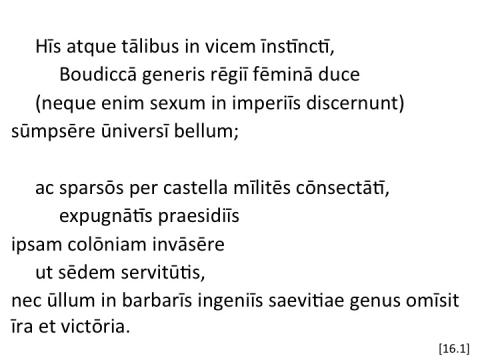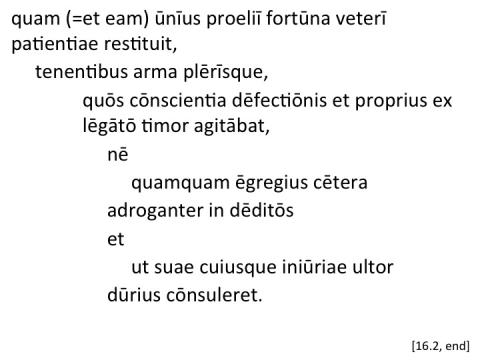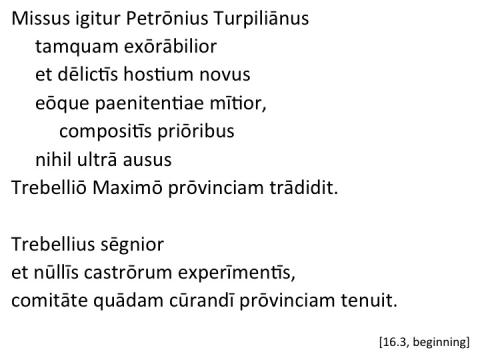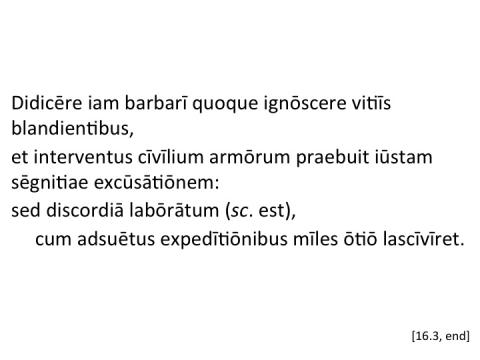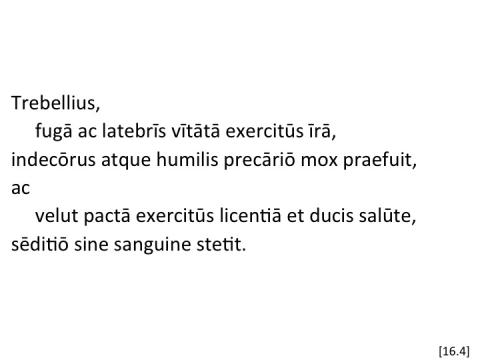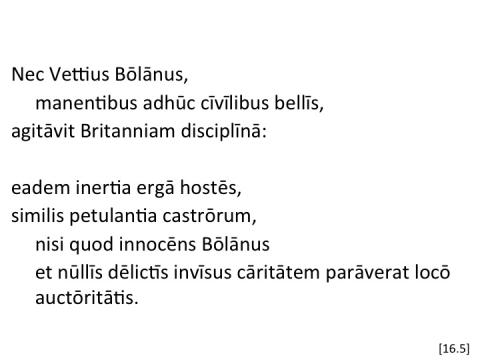Overview: The Britons seize arms and attack Camulodunum; Suetonius returns from Mona and puts down the rebellion. In consequence of his harsh measures of retaliation he is superseded by Trebellius, who is driven out of the province by a mutiny of his soldiers; insubordination is still rife under his successor. (Stuart); this chapter begins on f. 56v of the codex Aesinas.
16.1
Hīs atque tālibus: a Sallustian phrase ... occurring no fewer than twenty-two times in Tacitus. (Gudeman)
in vicem: see note on this word in 6.1. (Pearce)
Boudiccā: popularly known as Boadicea; she became sovereign of the Iceni after the death of her husband Prasutagus. Roused to revolt by indignities perpetrated on herself and her family, she essayed unsuccessfully to crush Roman power in Britain. (Stuart); this is explained as a Celtic word meaning "victorious." (Pearce); wife of Prasutagus, king of the Iceni. Her tragic history is given in detail in Ann. 14.31ff. and Dio Cass. 62.Iff. (Gudeman)
feminā duce: possibly a reminiscence of Vergil's dux femina facti, Aeneid, 1.364. (Stuart)
neque enim sexum ... discernunt: there is no evidence to show that women as a rule exercised sovereign power amongst the Britons. Boadicea owed her authority to her position as the wife of Prasutagus. However, in the household woman was held in high respect by the Celts as by the Germans. (Stuart); in Ann. 14.35, Boudicca more correctly says, solitum quidem Britannis feminarum ductu bellare, for the evidence available seems to make against the assumption of female rulers among Celtic tribes, except in rare instances, and Tacitus himself (Germ. 45) mentions the custom as a proof of the low and servile character of the Germanic Sitones. (Gudeman)
sūmpsēre ... bellum: an extension of the common phrase arma sumere. (Pearce); a Sallustian expression, copied from Thucydides ... and often used by Tacitus to avoid the trite phrase arma sumere. See Introd. p. xxxv, #6. (Gudeman)
sparsōs ... mīlitēs: Tacitus probably means the soldiers whom they caught in the open, as the actual storming of the garrisons is mentioned as a further stage immediately afterwards. In the Annals (14.33) he says that they avoided the castella and praesidia. (Pearce)
colōniam: Camulodunum; the veterans quartered there had rendered themselves obnoxious by evictions and other acts of oppression. (Stuart)
in barbarīs ingeniīs: an attributive phrase — "with which barbarians are familiar." (Stuart)
īra et victōria: the two separate motives that governed their conduct — wrath for past injuries urged them to vengeance; it was victory that made revenge possible. Translate: "fury and the consciousness of victory." (Stuart); "wrath incited by victory." On the singular predicate and the epexegetic et, see Introd. p. xxx,#18. According to Ann. 14.33, the towns of London and Verulam were sacked, the ninth legion all but exterminated, and some seventy thousand persons massacred. This figure is doubtless an exaggeration, but it nevertheless proves this to have been one of the most disastrous defeats which Rome ever sustained. (Gudeman)
16.2
quod nisi: "and unless"; literally, "as to which, unless." Quod in this construction indicates connection with the preceding sentence. It may be explained either as an old ablative form or as an accusative of respect. (Stuart) [A&G 397a]; only used by Tacitus in this work. In such phrases quod gives a loose connexion with the preceding sentence. (Pearce) [A&G 324d]; "and were it not that." So again ch. 26.2. (Gudeman)
foret: Cicero and Caesar would have used esset. (Pearce)
fortūna: best explained as nominative. (Stuart)
tenentibus ... plērīsque stands in a concessive relation to the main verb, "though many." (Pearce) tenentibus = retinentibus. (Gudeman)
cōnscientia dēfectiōnis: "guilty knowledge of (participation in) the revolt." (Stuart)
proprius: "the fear of the governor touched them more nearly still" (than the consciousness of their wrong-doing). (Pearce); "special, personal." (Gudeman)
ex lēgātō: equivalent to an objective genitive. (Stuart) [A&G 348] ex lēgātō timor: "fear of the legate." In this causal sense the preposition is very frequent in Tacitus, particularly with metus. (Gudeman)
ēgregius cētera: this would not come into the British point of view. It is a comment of Tacitus himself modifying the British judgement of Suetonius' character. He is probably giving us a summary of the report of the imperial commissioner, Julius Classicianus, on Suetonius' government, forgetting that he is supposed to be reflecting the feelings of the enemy alone. See note on his attributing the expressions divus and Germanias to the Britons in 15.4. (Pearce)
ut suae cuiusque iniūriae: "of every offense as if it were a personal matter." (Stuart) suae quisque iniūriae ultor: "avenging every insult, as if directed against himself," but the reading is doubtful. This suspicion, spread by the enemies of Paulinus, was the cause of his recall. See Ann.14.38f. (Gudeman); cuiusque and quisque (see notes above) are emendations for the manuscript's eiusque (see the top line of the left-hand column), which does not make sense here. (Damon)
16.3
missus, like ausus below, is the participle, not the finite verb with est understood. (Gudeman)
igitur: "consequently," i.e. because the fears of the Britons were shared at Rome and it was believed that the harshness of Suetonius would prolong the revolt. (Stuart); again refers to the Roman and not the British point of view. (Pearce)
Petrōnius Turpiliānus: P. Petronius Turpilianus, consul 61 CE, legatus Britanniae 61-63, curator aquarum 63-64, received the triumphalia ornamenta in 65. He was executed as a partisan of Nero by Galba in 68. (Gudeman)
tamquam: "on the alleged ground." See ch. 15.1. (Gudeman)
novus: with delictis (dat.) a post-classical construction. Translate, "a stranger to." (Pearce); "unacquainted with."... In this sense novus and exorabilior, immediately preceding, are found in Tacitus only here. (Gudeman)
paenitentiae: "toward the penitent." (Stuart); abstract for concrete, like ira et victoria above. (Pearce)
priōribus: "the previous turbulence." (Stuart); "the late outbreak." (Pearce); neuter, and so frequently in T. See note on 41.1. (Gudeman)
Maximō: M. Trebellius Maximus, governor of Britain 63-69; forced to take refuge with Vitellius as a result of a mutiny fomented by Roscius Coelius, the legate of the Twentieth Legion. See chapter 7.3. In the Histories, 1.60, Tacitus gives a less favorable account of Trebellius, accusing him of greed and niggardliness. (Stuart); a novus homo, consul in 55 or 56 CE ... . Observe the repetition of the name below, in place of qui or is, a favorite device of the author. (Gudeman)
nūllīs ... experīmentīs: ablative of description, coordinated with the adj. segnior. (Pearce) [A&G 415]; sc. vir, ablative of quality. "Without military experience." For this meaning of the substantive, see e.g. ch. 19.1. Et before a negative, here in place of neque ullis, is perhaps more common in Tacitus than in any other Latin writer. (Gudeman)
comitāte: exhibited toward the natives, not toward his own men. (Stuart)
cūrandī: provinciam is felt as the object of this as well as of tenuit. See note on curarum in 9.3, used "of the duties of office." (Pearce)
didicēre: on the emphatic position, see Introd. p. xxvi, #3. (Gudeman)
ignōscere vitiīs blandientibus: "to condone alluring weaknesses." Tacitus means that the native morality and strict ideals of life, which, according to his view, once distinguished the northern barbarians, had become things of the past among them as well as elsewhere (note quoque); the Britons, having learned to embrace the decadent ways of civilization, gave Trebellius no trouble. (Stuart); "to excuse attractive vices" ("such as sapped the energy of their conquerors") Furneaux. Or perhaps the meaning is "to allow the spread of such vices among themselves," another reason for the Roman slackness. (Pearce) ignōscere: said with a tinge of irony (Gudeman)
cīvīlium armōrum: the struggles attendant on the usurpations of the principate by Galba, Otho, Vitellius, and Vespasian. These conflicts actually coincided with only a year of the regime of Trebellius. (Stuart); i.e. the wars of 69 CE. (Pearce)
discordiā: see 7.3 for the facts. (Pearce)
labōrātum: sc. est. (Damon); "trouble arose." (Stuart)
mīles ōtiō lascīvīret: it was a cardinal principle of Roman military theory that "Satan finds mischief still for idle hands to do." (Stuart)
16.4
fugā: he finally took refuge with Vitellius. See Hist. I.60. (Gudeman)
precāriō: "on sufferance." (Stuart)
velut pactā ... et ducis: the text is that adopted by Woodman, who moves et here from after salute. Pacta > pacisco. Other editors emend to a form of paciscor (such as pacti, see notes below) and delete et. The passage is marked as problematic in the manuscript (see the sixth and fifth lines from the bottom of the left hand column and the correction in the lower margin). (Damon) velut pactī: "they struck a bargain as it were." (Stuart) pactī: sc. sunt. The subjects are exercitus and dux. The sentence explains precario. (Pearce) pactī: they compromised, the army retaining its mutinous disposition, the general his life. (Gudeman) et: "and thus." See 3.1. (Gudeman)
sēditiō sine sanguine stetit: the alliteration is probably not accidental; "insubordination subsided bloodlessly." (Stuart)
16.5
nec = ne ... quidem, which means (1) "not even" (a) "nor ... on his part" (as here). (Pearce)
Vettius Bōlānus: see on chapter 8.1. (Stuart)
agitāvit ... disciplīnā: sarcastic, "hardly convulsed Britain by his regime." (Stuart); "gave Britain trouble by employing his troops against it." For the facts see 8.1. (Pearce) agitāvit = exagitavit, i.e. he did not stir up Britain by any military activity. The verb is a favorite of Tacitus. erga = adversus. See note on 5.3. (Gudeman)
petulantia: "lawlessness." (Stuart)
nisi quod introduces the reservation which spoils the parallel between the rule of Bolanus and his predecessor. See 6.1. (Pearce)

